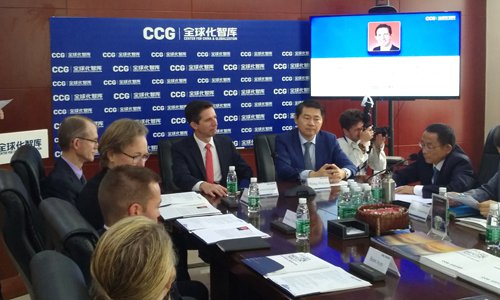HOME >> CHINA
Australia prioritizes concluding RCEP talks despite Indian hesitation
By Wang Wenwen Source:Global Times Published: 2019/8/2 18:23:40

Australian Trade Minister Simon Birmingham attends a roundtable discussion in Beijing on Friday organized by the Center for China and Globalization. Photo: Wang Wenwen/GT
Australia is making great efforts to conclude negotiations on the Regional Comprehensive Economic Partnership (RCEP) agreement and is determined to work constructively with China, Australian Minister for Trade, Tourism and Investment Simon Birmingham said in Beijing on Friday.
"It is an opportunity for both China and Australia, and indeed all 16 RCEP nations, to show leadership to the world that we continue to stand for more open markets and for greater trade and economic integration," Birmingham said at a roundtable discussion organized by the Center for China & Globalization (CCG).
Birmingham will represent Australia at the eighth RCEP ministerial meeting which will be held in Beijing from August 2-3.
He is the first minister sent by the government of Scott Morrison to Beijing since the federal elections in mid-May.
The RCEP agreement, if reached, would encompass 30 percent of global GDP and half of the world population. It takes in all 10 ASEAN member states and China, Japan, South Korea, Australia, New Zealand and India.
It is widely anticipated that the negotiations can be concluded by the end of this year. At the just-concluded ASEAN Foreign Ministers' Meeting in Bangkok, foreign ministers of the bloc reiterated their commitment to reaching a deal within the year.
Among the 16 stakeholders, India is viewed as a major barrier to concluding the RCEP. It has raised concerns about the risk the deal would pose to its economy if it is to remove tariffs on Chinese imports.
India Commerce Minister Piyush Goyal will skip the ongoing RCEP trade ministers meeting in Beijing, and India will be represented by Commerce Secretary Anup Wadhawan. This has fuelled speculations that India may drop out of RCEP negotiations.
Zhou Xiaoming, former deputy permanent representative of China's Permanent Mission to the UN office in Geneva and a senior fellow of CCG, who also attended the roundtable discussion on Friday, told the Global Times that India's manufacturing industry is not that developed so the country worries that once it opens its door wider and reduces tariffs, its national industries will be affected.
"Not only in RCEP negotiations, but also in WTO talks, India has shown a conservative attitude," Zhou added.
The Sydney Morning Herald reported on Thursday that Birmingham will hold talks with his Chinese and Indian counterparts to break down Indian resistance to removing agricultural tariffs.
Birmingham said, "India has resisted some of the approach to reform," allowing itself to lag behind China's "economic miracles," according to the report.
But during Friday's discussion, Birmingham toned down earlier claims and refuted India's possible departure from RCEP talks when responding to a Global Times question, and said, "We look forward to working as hard as we can to ensure the all 16 RCEP countries, including India, are part of the conclusion of the negotiations at the end of the year."
Newspaper headline: Australia prioritizes achieving RCEP
RELATED ARTICLES:
Posted in: DIPLOMACY,CHINA FOCUS